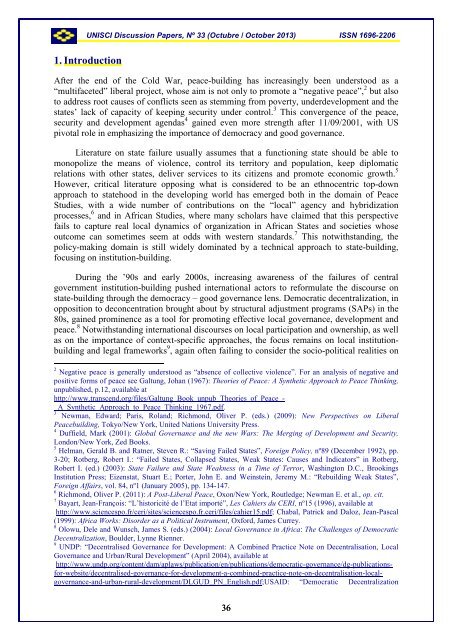UNISCI - Universidad Complutense de Madrid
UNISCI - Universidad Complutense de Madrid
UNISCI - Universidad Complutense de Madrid
Create successful ePaper yourself
Turn your PDF publications into a flip-book with our unique Google optimized e-Paper software.
<strong>UNISCI</strong> Discussion Papers, Nº 33 (Octubre / October 2013) ISSN 1696-22061. IntroductionAfter the end of the Cold War, peace-building has increasingly been un<strong>de</strong>rstood as a“multifaceted” liberal project, whose aim is not only to promote a “negative peace”, 2 but alsoto address root causes of conflicts seen as stemming from poverty, un<strong>de</strong>r<strong>de</strong>velopment and thestates’ lack of capacity of keeping security un<strong>de</strong>r control. 3 This convergence of the peace,security and <strong>de</strong>velopment agendas 4 gained even more strength after 11/09/2001, with USpivotal role in emphasizing the importance of <strong>de</strong>mocracy and good governance.Literature on state failure usually assumes that a functioning state should be able tomonopolize the means of violence, control its territory and population, keep diplomaticrelations with other states, <strong>de</strong>liver services to its citizens and promote economic growth. 5However, critical literature opposing what is consi<strong>de</strong>red to be an ethnocentric top-downapproach to statehood in the <strong>de</strong>veloping world has emerged both in the domain of PeaceStudies, with a wi<strong>de</strong> number of contributions on the “local” agency and hybridizationprocesses, 6 and in African Studies, where many scholars have claimed that this perspectivefails to capture real local dynamics of organization in African States and societies whoseoutcome can sometimes seem at odds with western standards. 7 This notwithstanding, thepolicy-making domain is still wi<strong>de</strong>ly dominated by a technical approach to state-building,focusing on institution-building.During the ’90s and early 2000s, increasing awareness of the failures of centralgovernment institution-building pushed international actors to reformulate the discourse onstate-building through the <strong>de</strong>mocracy – good governance lens. Democratic <strong>de</strong>centralization, inopposition to <strong>de</strong>concentration brought about by structural adjustment programs (SAPs) in the80s, gained prominence as a tool for promoting effective local governance, <strong>de</strong>velopment andpeace. 8 Notwithstanding international discourses on local participation and ownership, as wellas on the importance of context-specific approaches, the focus remains on local institutionbuildingand legal frameworks 9 , again often failing to consi<strong>de</strong>r the socio-political realities on2 Negative peace is generally un<strong>de</strong>rstood as “absence of collective violence”. For an analysis of negative andpositive forms of peace see Galtung, Johan (1967): Theories of Peace: A Synthetic Approach to Peace Thinking,unpublished, p.12, available athttp://www.transcend.org/files/Galtung_Book_unpub_Theories_of_Peace_-_A_Synthetic_Approach_to_Peace_Thinking_1967.pdf.3Newman, Edward; Paris, Roland; Richmond, Oliver P. (eds.) (2009): New Perspectives on LiberalPeacebuilding, Tokyo/New York, United Nations University Press.4 Duffield, Mark (2001): Global Governance and the new Wars: The Merging of Development and Security,London/New York, Zed Books.5 Helman, Gerald B. and Ratner, Steven R.: “Saving Failed States”, Foreign Policy, nº89 (December 1992), pp.3-20; Rotberg, Robert I.: “Failed States, Collapsed States, Weak States: Causes and Indicators” in Rotberg,Robert I. (ed.) (2003): State Failure and State Weakness in a Time of Terror, Washington D.C., BrookingsInstitution Press; Eizenstat, Stuart E.; Porter, John E. and Weinstein, Jeremy M.: “Rebuilding Weak States”,Foreign Affairs, vol. 84, nº1 (January 2005), pp. 134-147.6 Richmond, Oliver P. (2011): A Post-Liberal Peace, Oxon/New York, Routledge; Newman E. et al., op. cit.7 Bayart, Jean-François: “L’historicité <strong>de</strong> l’Etat importé”, Les Cahiers du CERI, nº15 (1996), available athttp://www.sciencespo.fr/ceri/sites/sciencespo.fr.ceri/files/cahier15.pdf; Chabal, Patrick and Daloz, Jean-Pascal(1999): Africa Works: Disor<strong>de</strong>r as a Political Instrument, Oxford, James Currey.8 Olowu, Dele and Wunsch, James S. (eds.) (2004): Local Governance in Africa: The Challenges of DemocraticDecentralization, Boul<strong>de</strong>r, Lynne Rienner.9 UNDP: “Decentralised Governance for Development: A Combined Practice Note on Decentralisation, LocalGovernance and Urban/Rural Development” (April 2004), available athttp://www.undp.org/content/dam/aplaws/publication/en/publications/<strong>de</strong>mocratic-governance/dg-publicationsfor-website/<strong>de</strong>centralised-governance-for-<strong>de</strong>velopment-a-combined-practice-note-on-<strong>de</strong>centralisation-localgovernance-and-urban-rural-<strong>de</strong>velopment/DLGUD_PN_English.pdf;USAID:“Democratic Decentralization36
















